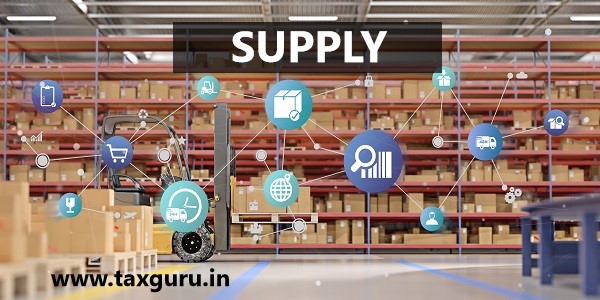Section 7(1) of CGST Act, 2017 states that the expression ‘Supply’ includes:
1. all forms of supply of goods or services or both such as sale, transfer, barter, exchange, licence, rental, lease or disposal made or agreed to be made for a consideration by a person in the course or furtherance of business;
2. import of services for a consideration whether or not in the course or furtherance of business;
3. the activities specified in Schedule I, made or agreed to be made without a consideration; and
4. the activities to be treated as supply of goods or supply of services as referred to in Schedule II.
*The said section has been amended through the CGST (Amendment) Act, 2018 with retrospective effect i.e. with effect from 01.07.2017. As per the amendment clause (d) has been deleted and subsection 1A has been inserted w.e.f 01.07.2017 which states that “where certain activities or transactions constitute a supply in accordance with the provisions of sub-section (1), they shall be treated either as supply of goods or supply of services as referred to in Schedule II.”

Now first we have to check whether the activities or transactions are supply or not and if it is a supply as per section 7(1) then only we have to refer the Schedule II to check whether the said activity or transaction will constitute supply of goods or supply of Services. Earlier all the activities mentioned in schedule II were treated as supply.
As per schedule II activities of agreeing to the obligation to refrain from an act, or to tolerate an act or situation or to do an act is to be treated as supply of service. Therefore, if the person paid the liquidated damages and it is not mentioned in the contract then it will not be considered as supply.
Further, as per the Schedule III as amended by CGST (Amendment) Act, 2018 the following transactions are neither considered as supply of goods nor supply of services:
1. Supply of goods from a place in the non-taxable territory to another place in the non-taxable territory without such goods entering into India e. Third Country Transactions
2. Supply of warehoused goods to any person before clearance for home consumption e. In Bond House Sale and
3. Supply of goods by the consignee to any other person, by endorsement of documents of title to the goods, after the goods have been dispatched from the port of origin located outside India but before clearance for home consumption e. High Seas Sale.
Since all the three transactions are covered under schedule III therefore these transactions are not treated as exempt supply as defined u/s 2(47) of CGST Act, 2017. Further, these transactions are also not included in the value of exempt supply as stated under section 17(3) of CGST Act, 2017. Hence, there is no requirement of reversal of Common Input Tax Credit u/s 17(2) of CGST Act, 2017.






Greetinga!
Very nice Post